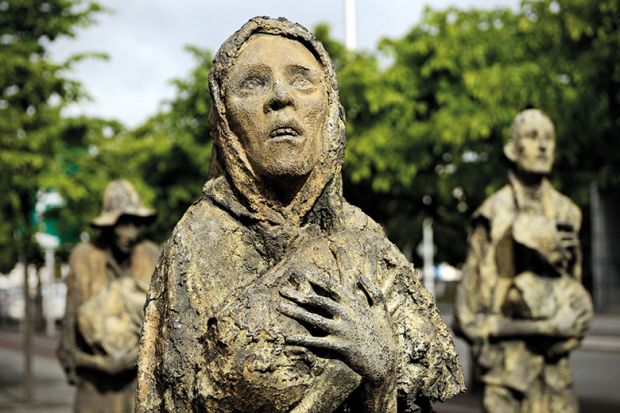Famines have become less frequent and less deadly. “At least one hundred million people died in great and calamitous famines in the 140 years from 1870 to 2010,” according to Alex de Waal, “and almost all of them died before 1980.” But in the past seven years there’s been a worrying resurgence of famine. In Yemen, Somalia and Nigeria, food scarcity has developed into mass casualties. Mass Starvation: The History and Future of Famine asks why this has happened.
The book argues that famines have always been a product of politics rather than a lack of resources. So their resurgence has more to do with the political economy than with food scarcity, droughts or lack of rainfall. From their late 19th-century colonial origins to present-day calamities, food shortages have developed into mass catastrophes because they were designed for it. Major famines of the 20th century – including the Ukrainian famine in the early 1930s, the Nazi Hungerplan and Mao’s Great Leap Forward of 1958-62 – were part of a genocidal plan. Relief technologies might have helped the plight of famine victims, de Waal claims, but the conquest and, crucially, the return of famines have more to do with wars and lack of international accountability than with food aid. Famines, in other words, are a weapon of war. And we have not done enough to stop them.
This argument is not particularly new to anyone who is familiar with de Waal’s work. A leading authority on the topic, he has been an important activist and writer about famine and other emergencies in Africa since the late 1980s. He is an interesting figure in his own right, and an important voice against the white-saviour complex of liberal humanitarianism. In 1991, he produced for Human Rights Watch what is still one of the most important reports on the Ethiopian famines. Titled Evil Days, this took the humanitarian imaginary about the so-called biblical famines in Ethiopia and confronted it with the post-colonial and Cold War circumstances that produced the disasters of the 1980s. Yet, less than three years later, de Waal resigned from Human Rights Watch in protest against US military intervention in Somalia. He was an ardent critic of the military humanitarianism of the 1990s and, crucially, went on to coin the term “famine crime” in order to re-embed famines within the political economy that produced them. Instead of feel-good humanitarianism, he advocated for a more robust notion of global justice and led various non-governmental organisations such as Justice for Africa, which have recorded human rights abuses in the continent.
By the aftermath of the Iraq War, however, de Waal had gone full circle when he wrote against the International Criminal Court and vehemently supported African sovereignty at the expense of interventionism. He became disillusioned by the individualistic framework of human rights and by international mechanisms more generally.
In Mass Starvation, however, de Waal returns to the international legal framework of human rights and genocide. What the book reveals is that, in our current political conjuncture, even the most ardent critics of the so-called humanitarian international have not forged an alternative framework. With Somalia still recovering from the 2011 famine and Yemen’s devastating famine deepening, de Waal argues that Britain and the US have become complicit in famine warfare because of the way that they have played with the politics of aid. Worse; the book suggests (although does not elaborate in enough detail) that the War on Terror and particularly the Patriot Act have generated a counter-humanitarianism that helped to manufacture hunger. If famines are political, so is their relief – or lack of it.
Tehila Sasson is an assistant professor of history at Emory University in Georgia.
Mass Starvation: The History and Future of Famine
By Alex de Waal
Polity, 264pp, £55.00 and £16.99
ISBN 9781509524662 and 4679
Published 24 November 2017
Register to continue
Why register?
- Registration is free and only takes a moment
- Once registered, you can read 3 articles a month
- Sign up for our newsletter
Subscribe
Or subscribe for unlimited access to:
- Unlimited access to news, views, insights & reviews
- Digital editions
- Digital access to THE’s university and college rankings analysis
Already registered or a current subscriber? Login




